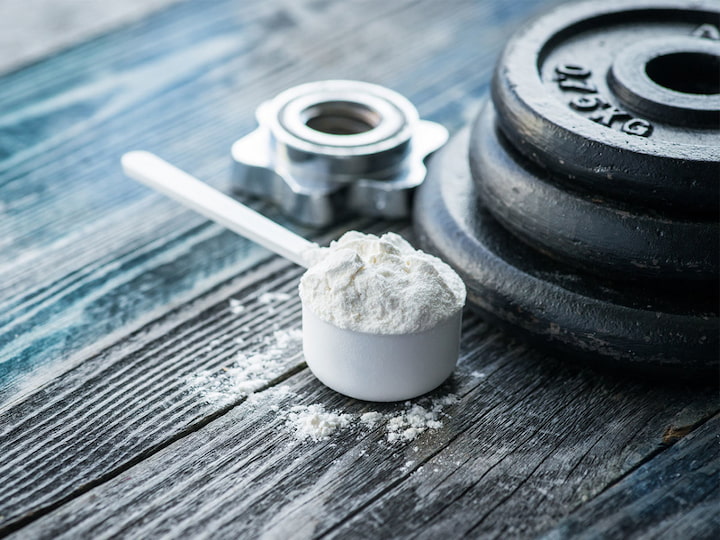Strength training and achieving muscle growth often work hand in hand, with supplements playing a vital role in supporting these fitness objectives. Among the various supplements, creatine stands out as a popular option for maximising muscle gains. Its impact on enhancing strength, power, and muscle performance has made it a staple in the fitness realm. Understanding how this supplement works, its benefits, and the best practices for its utilisation can provide valuable insights into whether or not you should incorporate it into your workout routine.
What Is Creatine?
Creatine is an amino acid naturally found in foods like red meat and fish. It’s also produced in the human body, primarily in the liver, kidneys, and pancreas. As a supplement, it is popular among athletes and fitness enthusiasts due to its role in producing energy during high-intensity, short-duration activities.
Often used to boost muscle strength, increase exercise performance, and aid muscle recovery, creatine is known for promoting water retention in muscles, leading to a temporary increase in muscle size. Its widespread use stems from its potential to enhance athletic performance and support muscle growth during workouts.

Forms and Dosage
Creatine, available in various forms such as creatine ethyl ester, buffered creatine, and micronised creatine, is a popular supplement for enhancing athletic performance. However, creatine monohydrate stands out as the most extensively researched and widely used. It’s known for its cost-effectiveness and solid scientific support regarding its efficacy. Because of these factors, opting for effective creatine monohydrate supplements is considered the best choice if you’re seeking reliable and effective supplementation to enhance your athletic endeavours.
When taking creatine monohydrate, you can follow two phases: the loading phase and the maintenance phase. During the loading phase, you would typically consume about 20 grams split into smaller doses daily for 5-7 days to saturate your muscles quickly. Afterwards, you can switch to a maintenance phase with a lower dose of 3-5 grams per day.
Some might skip the loading phase and directly start with the maintenance dose. It’s crucial to tailor the dosage to your needs, so consulting with a healthcare professional or fitness expert is recommended. It’s also essential to stay well-hydrated while using creatine to ensure its effectiveness and minimise potential side effects.
How Does It Work?
Creatine works by helping your body produce more of a molecule called ATP, which acts as the primary energy source for your muscles during exercise. When you take creatine as a supplement, it gets stored in your muscles as phosphocreatine.
During high-intensity activities like lifting weights or sprinting, your muscles need a lot of energy quickly. Phosphocreatine steps in to supply extra energy by giving up its phosphate group to regenerate ATP. This process allows your muscles to generate more ATP rapidly, providing them with the fuel they need to perform better during short, intense bursts of exercise.
In simple terms, creatine acts like a reserve battery for your muscles, allowing them to produce more energy (in the form of ATP) when they need it most. This extra energy can help you push harder during workouts and may lead to improved performance and muscle gains over time.

Benefits of Creatine Supplementation
Enhanced Strength and Power
This supplement offers enhanced strength and power as a notable benefit. By boosting the production of ATP, the body’s energy currency, it supports muscles during high-intensity exercises. This heightened ATP production allows muscles to work harder, generating more power and strength during workouts. As a result, users often experience improved performance, increased strength output, and the ability to push themselves further in their training sessions.
Improved Exercise Performance
Creatine is also advantageous in activities that demand quick bursts of energy like sprinting, jumping, or resistance training. Its capacity to delay fatigue and enhance overall performance makes it a valuable supplement for these exercises. By boosting energy levels, creatine aids in maintaining peak performance during short-duration, high-intensity activities, allowing individuals to push their limits and perform at their best.
Muscle Growth
Creatine supplementation supports muscle growth by enhancing training capabilities, enabling individuals to perform more reps or lift heavier weights during resistance training. This increased workload stimulates muscle adaptation and growth over time. By enhancing training capacity, creatine aids in pushing physical limits, fostering greater muscular hypertrophy, and contributing to the development of increased muscle mass with consistent and targeted workouts.
Recovery
Creatine’s post-exercise benefits include reduced muscle damage and inflammation, potentially shortening recovery time between workouts. Its ability to mitigate exercise-induced damage aids in faster muscle repair and diminishes inflammation markers, promoting quicker recuperation. By supporting the body’s recovery process, creatine supplementation can allow athletes and fitness enthusiasts to bounce back faster from intense workouts, facilitating more frequent or higher-quality training sessions for improved overall performance.
Who Should Use Creatine?
Creatine can be beneficial for various individuals, but it’s especially popular among:
- Athletes: Those involved in high-intensity sports or activities requiring short bursts of energy, such as sprinting, weightlifting, or team sports like basketball or football, may benefit from creatine supplementation to enhance their performance.
- Fitness Enthusiasts: People engaged in resistance training or high-intensity interval workouts seeking improved strength, power, and muscle endurance can consider using creatine to aid their exercise regimen.
- Individuals Looking to Build Muscle: Creatine supplementation might support muscle growth (hypertrophy) by facilitating better workout performance, potentially aiding those aiming for increased muscle mass.
- Individuals Recovering from Injury or Certain Medical Conditions: Some people with specific health conditions like muscle atrophy, neuromuscular disorders, or injuries might benefit from creatine supplementation as it could assist in muscle recovery and strength maintenance.

Safety and Side Effects
Creatine supplementation is generally considered safe for most individuals if you take it within recommended doses. However, some potential side effects might occur, such as gastrointestinal discomfort, cramping, or dehydration, especially if adequate water intake isn’t maintained. It’s important to point out that individuals with pre-existing kidney conditions should use creatine cautiously and under medical supervision.
Also, some people may experience weight gain due to water retention in the muscles. To ensure safety, it’s advisable to adhere to recommended dosages, maintain proper hydration, and consult a healthcare professional before starting creatine supplementation, particularly if you have health concerns. Keep in mind that supplements should complement, not replace, a balanced diet and regular physical activity. They serve as supportive additions to aid in achieving your goals more efficiently.